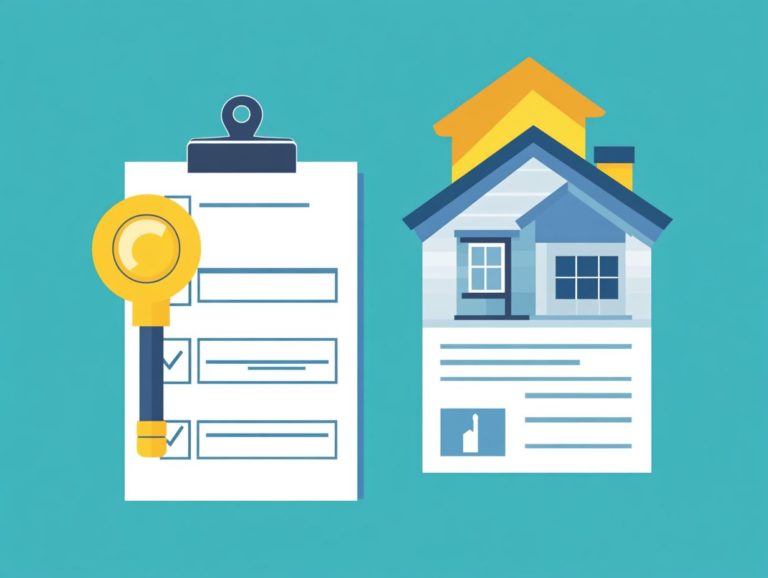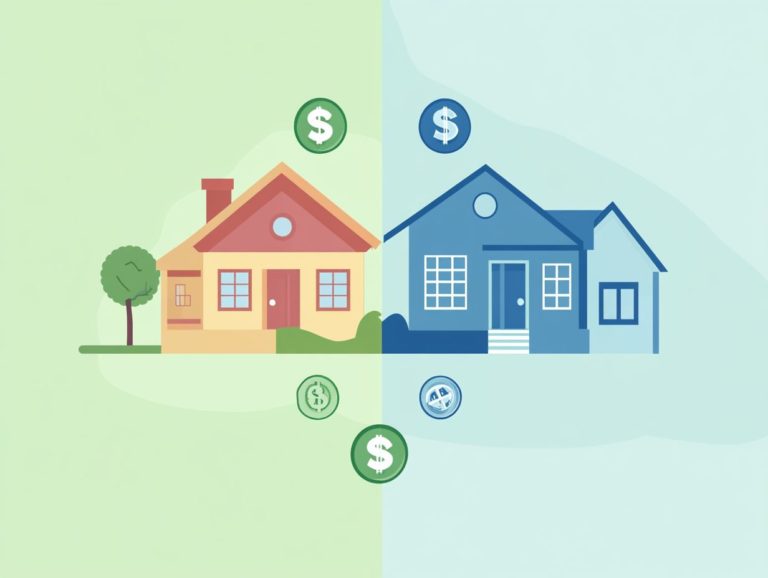5 Tips for Lowering Your Mortgage Interest Rate
Looking to save money on your mortgage? Lowering your mortgage interest rate can drastically improve your monthly payments and enhance your overall financial well-being. Get ready to explore five powerful strategies to help you achieve this goal!
This article covers effective ways to boost your credit score, make larger down payments, and understand factors influencing interest rates. It also highlights how refinancing can benefit you and the common pitfalls to avoid.
Whether you re a first-time homebuyer or considering a refinance, these insights will empower you to make informed financial decisions.
Contents
- Key Takeaways:
- 1. Improve Your Credit Score
- 2. Shop Around for Lenders
- 3. Consider a Shorter Loan Term
- 4. Make a Larger Down Payment
- 5. Negotiate with Your Current Lender
- What Factors Affect Mortgage Interest Rates?
- How Can Refinancing Help Lower Your Mortgage Interest Rate?
- What Are Some Other Ways to Save on Mortgage Interest?
- What Are the Benefits of a Lower Mortgage Interest Rate?
- How Can One Prepare for a Mortgage Refinance?
- What Are Some Common Mistakes to Avoid When Trying to Lower Your Mortgage Interest Rate?
Key Takeaways:

Improving your credit score can lead to a lower mortgage interest rate.
Shopping around and comparing lenders can help you find the best rate for your mortgage.
Choosing a shorter loan term can result in a lower interest rate and overall savings.
1. Improve Your Credit Score
Improving your credit score is essential for homebuyers seeking favorable mortgage rates. It directly impacts the interest rates lenders offer. A higher credit score can lead to substantial savings on closing costs throughout the loan period.
To enhance your credit rating, focus on a few key strategies:
-
First and foremost, timely payment of bills is crucial. Consistently paying your credit cards, utilities, and other obligations shows financial responsibility that lenders appreciate.
-
Reducing outstanding credit card balances is another effective approach. Maintaining a low amount of credit you’re using compared to your credit limit signals to lenders that you re not overly reliant on credit.
-
Regularly check your credit reports for inaccuracies. Errors can negatively affect your creditworthiness.
By actively implementing these strategies, you position yourself for better loan offers. You’ll enjoy lower monthly mortgage payments, making homeownership more attainable. Don’t miss out on these savings!
2. Shop Around for Lenders
Shopping around for mortgage lenders is crucial for you as a homebuyer. It gives you the opportunity to compare loan offers, interest rates, and terms, ensuring that you secure the best deal available, whether it’s for conventional loans, FHA loans, or VA loans.
Explore options offered by traditional banks, online mortgage brokers, and credit unions. Each lender may bring unique advantages or competitive pricing to the table, significantly impacting your overall costs.
Taking the time to evaluate interest rates alongside additional fees, like origination fees or closing costs, enables you to make informed decisions. This thorough research becomes even more essential if you’re considering refinancing options. A slight variation in interest rates can translate into substantial savings over time. Start your journey to better rates today!
3. Consider a Shorter Loan Term

Choosing a shorter loan term has major benefits. It can lower your overall interest costs and provide more manageable mortgage payments throughout the life of the loan, even if it does mean higher monthly payments compared to a longer mortgage term.
This approach accelerates your equity buildup and protects you from potential interest rate hikes associated with adjustable-rate mortgages. These fluctuations can introduce uncertainty into your long-term budgeting.
By committing to a fixed, shorter duration, you may find that the considerable interest savings more than compensate for the initial discomfort of those higher monthly payments. This strategic decision fosters financial discipline and can lead to a more secure investment, especially in a fluctuating market.
Ultimately, while the prospect of larger payments might seem intimidating, the long-term financial rewards particularly regarding total interest savings are likely to far outweigh the short-term sacrifices. Don’t hesitate to make this wise choice!
4. Make a Larger Down Payment
Making a larger down payment when purchasing a home can significantly influence your financial landscape. This reduces the need for mortgage insurance. You ll also increase your equity and enjoy lower monthly payments.
When you choose to invest more upfront, you often have the opportunity to bypass Private Mortgage Insurance (PMI), which is an insurance that lenders require if your down payment is less than 20%. A higher down payment not only enhances your chances of securing favorable loan terms think lower interest rates and reduced closing costs but also establishes a robust equity foundation right from the start.
This increased equity offers a strategic advantage for future refinancing options or home equity loans. It grants you greater flexibility to leverage your investment. Whether it s managing unexpected expenses or funding significant projects, you can navigate these financial waters without succumbing to high-interest debt.
So, start planning your larger down payment today!
5. Negotiate with Your Current Lender
Don’t miss the chance to negotiate with your lender for better terms! It could lead to more favorable refinancing terms, reduced closing costs, and even lower mortgage insurance premiums.
This process becomes particularly advantageous when you take the time to familiarize yourself with current market rates. Armed with this knowledge, you can approach your lender confidently, demonstrating your understanding of the landscape.
By highlighting your creditworthiness and the competitive offers you’ve come across, you position yourself as a savvy borrower. Preparation is key gather your financial documents, know your credit score, and be ready to discuss alternatives. This preparation enhances your negotiating stance.
Keeping a clear goal in mind whether it s securing a lower interest rate or minimizing fees enables you to communicate your needs effectively and paves the way for fruitful discussions.
What Factors Affect Mortgage Interest Rates?

Several factors influence mortgage interest rates that you should be aware of, including your credit score, the lender’s requirements, prevailing economic conditions, and the property taxes and discount points tied to your mortgage.
Each of these elements plays a crucial role in determining the interest rate you’ll receive. For instance, a strong credit score can significantly enhance your chances of securing lower rates, as it reflects a history of reliable repayment.
On the flip side, if your credit score isn t as favorable, lenders may see you as a higher risk and adjust the rates accordingly. They also take into account factors such as your debt-to-income ratio, employment stability, and the size of your down payment when assessing the overall risk.
Thus, maintaining a good credit score is not just important for qualifying for a mortgage; it also has a substantial impact on the affordability of your monthly payments over time.
How Can Refinancing Help Lower Your Mortgage Interest Rate?
Refinancing your mortgage can be a savvy move to lower your interest rate, especially if market rates have dipped or if your credit score has seen a significant boost since you first secured your loan.
By choosing to refinance, you could enjoy reduced monthly payments. This grants you greater financial flexibility each month. It s essential to take the time to research the various loan terms available, ensuring you find a deal that aligns perfectly with your long-term financial objectives.
Be mindful of any associated fees during this process, like closing costs, as they can impact your overall savings. Consider whether an adjustable-rate mortgage fits your financial situation. It might reveal more favorable options, giving you the opportunity to maximize your investment.
What Are Some Other Ways to Save on Mortgage Interest?
You can save on mortgage interest through several strategies. Consider purchasing discount points to lower your interest rate upfront, exploring loan modifications, or using home equity to find better refinancing deals.
Each method has unique benefits and drawbacks. For example, buying discount points can lower your monthly payments, but it requires an upfront investment that may stretch your budget.
Loan modifications can help if you’re struggling to make payments. However, be prepared for potentially lengthy approval processes and the possibility of impacting your credit score.
Using home equity for refinancing can also lead to better rates, but it comes with the risk of losing your home if not managed carefully. By thoroughly understanding these options, you can tailor your approach to align with your long-term financial goals.
What Are the Benefits of a Lower Mortgage Interest Rate?

Securing a lower mortgage interest rate offers you a wealth of benefits. These include reduced mortgage payments, increased equity in your home over time, and enhanced financial flexibility for future investments.
With those lower monthly payments, you can breathe easier. This financial relief allows you to manage your finances with greater ease and reduces strain on your budget.
The extra funds can enable you to invest in essential home improvements, elevating both the beauty and the value of your property.
These enhancements create a more enjoyable living environment and contribute to the growth of your equity, ensuring that your investment remains sound and rewarding in the long run.
How Can One Prepare for a Mortgage Refinance?
Preparing for a mortgage refinance demands a strategic approach. Start by checking and improving your credit score. Gather all necessary documents and analyze any associated closing costs to ensure a seamless experience with your mortgage lender.
Once you’ve laid that groundwork, assessing your home equity becomes essential. It will significantly influence your refinancing options. Reviewing your credit history helps you spot discrepancies and address them promptly, ultimately enhancing your chances of securing better terms.
Understanding the intricacies of the refinancing process can help demystify it for you. This knowledge guides you from the initial application to the final approval.
To make the most informed decision, take the time to shop around for lenders. Compare interest rates and fees, and don t hesitate to ask questions along the way.
Engaging with online calculators can also provide valuable estimates, aiding you in evaluating potential savings.
What Are Some Common Mistakes to Avoid When Trying to Lower Your Mortgage Interest Rate?
Avoid these common mistakes to save big on your mortgage! When you’re looking to lower your mortgage interest rate, be mindful of common missteps. Don’t fall into the trap of neglecting to shop around for lenders or failing to enhance your credit score. For more tips, check out how to get the best rate on your mortgage.
It s crucial to conduct thorough research. Comparing rates from multiple lenders is key, as even minor differences can lead to significant savings over time.
Examine your credit profile closely and take steps to boost your score after all, a better credit rating could unlock those coveted lower interest rates. It’s also important to understand buying discount points this means making an upfront payment to secure a lower rate.
Grasping whether this strategy aligns with your personal financial goals can make a world of difference. Seek advice from financial professionals to gain invaluable insights, helping you make informed decisions throughout your refinancing journey ensuring you maximize benefits while minimizing risks.
Frequently Asked Questions
What is a mortgage interest rate?
A mortgage interest rate is the percentage of your loan amount that you pay to a lender in exchange for borrowing money to purchase a home.
Why is it important to lower my mortgage interest rate?
Lowering your mortgage interest rate can save you thousands of dollars over the life of your loan, making homeownership more affordable and putting more money back in your pocket.
What are 5 tips for lowering my mortgage interest rate?
- Improve your credit score
- Shop around for the best rate
- Consider a shorter loan term
- Make a larger down payment
- Refinance your mortgage
How can I improve my credit score to lower my mortgage interest rate?
You can improve your credit score by paying your bills on time, keeping your credit card balances low, and checking your credit report for any errors that may be negatively impacting your score.
Is it worth it to refinance my mortgage to lower my interest rate?
This depends on your individual circumstances, such as the current interest rate, your credit score, and how long you plan on staying in your home. Weigh the costs of refinancing against the potential savings to determine if it’s the right move for you.
How long does it take to see the effects of lowering my mortgage interest rate?
It can vary, but typically you will see the effects immediately in the form of a lower monthly mortgage payment. Over time, the overall savings will add up as well.
Don’t miss out on these savings! Start your journey to lower your mortgage rates today!






